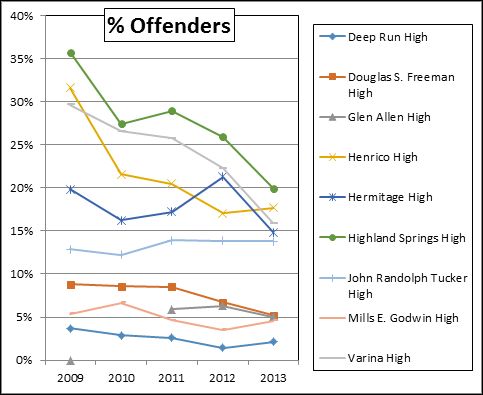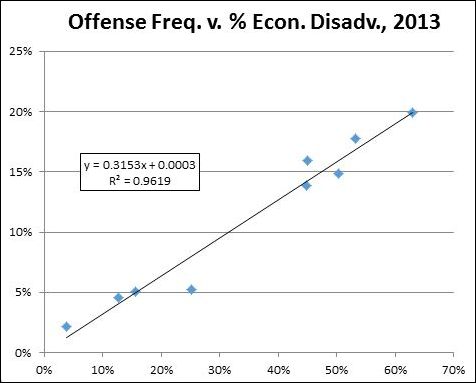by James A. Bacon
In a recent post, “Spotlighting the Wrong Victims,” I questioned the premise that “disparities” in arrests and suspensions of Henrico County students for school offenses represented some form of racial injustice. John Butcher, author of CrankysBlog, sheds further light on the issue. Read this post as a footnote to the original.
First, John notes, Henrico County has been reporting fewer disciplinary incidents each year for its high schools, as reflected by the number of individual offenders as a percentage of the school population:
What’s noteworthy here is that the most dramatic declines occurred at Henrico’s predominantly black high schools. On the surface, the trend looks highly positive. Fewer students are experiencing disciplinary issues. Perhaps Henrico County’s new politically correct approach to handling problems, put into place at the instigation of the ACLU and U.S. Justice Department, is working!
Alternatively, perhaps school administrators aren’t recording incidents they once would have. Perhaps they’re hiding the problem and, by hiding it, failing to deal with it — a very bad thing. We can’t tell from this data. But we need to know.
Next, John took the offense data from each school and graphed it in relationship to (1) the percentage of black students and (2) the percentage of economically disadvantaged children.
The correlation between the percentage of children experiencing a disciplinary offense and the percentage of blacks in a high school was very high — an r² of 0.907. But the correlation with the percentage of economically disadvantaged students was even higher — an r² of .9619, which is extraordinarily high. As John observes, “Correlation is NOT causation but at least this is consistent with the notion [that] the root of the disorder is economic status, not race.”
Bacon’s bottom line: Do-gooders who attribute the high rates of arrest and suspensions among black Henrico County students to prejudice, discrimination or institutional bias are fanning the flames of racial resentment with little basis in fact. I’m not stating that discrimination doesn’t exist but I am saying that the do-gooders have not presented meaningful evidence that it does.
As an alternative explanation, I hypothesize that the critical variables affecting the likelihood that a student will be arrested or suspended from Henrico County schools are sociological. Students classified as “economically disadvantaged” are far more likely than other students to come from dysfunctional families where the biological father is absent, where there are substance abuse issues, where there are domestic violence issues, where adolescents are more subject to the peer pressure of “the street,” and, in sum, where adolescents, especially boys, do not learn the rules of behavior required for a school setting.
Poor discipline in school is not a race issue. It’s a class issue. By making it a race issue, I would argue, the do-gooders are distracting school administrators from dealing with the real problems.
Here’s a prediction. Henrico’s politically correct response to the “racial disparity” controversy will undermine administrators’ efforts to maintain school discipline. Actual discipline will suffer, even if not reflected in the reported statistics. Deteriorating discipline will negatively impact classroom teaching conditions, mainly in schools where the discipline problems are concentrated. Standard of Learning (SOL) scores will suffer. Disadvantaged black students who abide by the rules will suffer the most.




